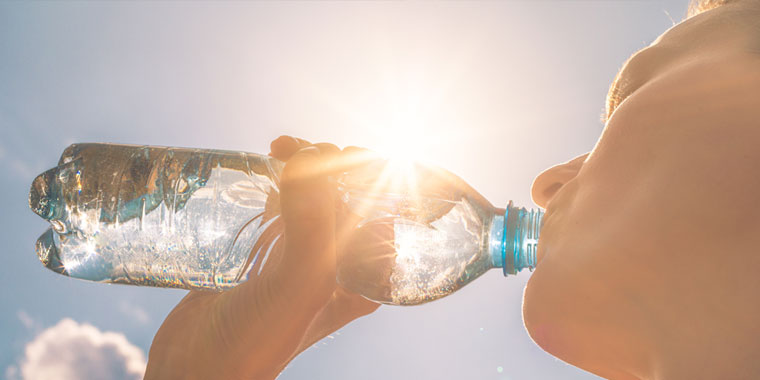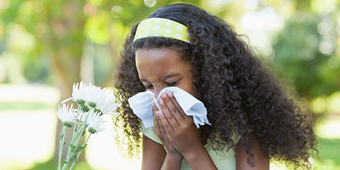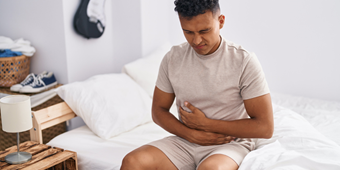Survive the Heat: Keep Cool And Hydrate

Find Your Perfect Match
Answer a few questions and we'll provide you with a list of primary care providers that best fit your needs.
As extreme heat becomes more common, it’s important to keep yourself and your loved ones healthy and safe when spending time outdoors.
The best thing to do is to set yourself up for success against the heat, says Brittany Jamison, an advanced practice registered nurse (APRN) with Premier Health Urgent Care.
“Make sure you are hydrated before heading outside into the sun and heat. You can’t easily play catch up once you’re overheated and dehydrated,” Jamison says. “Have plenty of cool water or an electrolyte solution on hand to replenish your body as you sweat in the heat. Especially while swimming or participating in other water activities, it's common for people to think they aren't sweating or overheating."
Recognize the Signs Of Heat Illness
Heat waves are occurring more often. When high temperatures and high humidity combine, the oppressive wet blanket that covers the region makes it difficult to stay cool outside.
Such extreme weather can cause heat-related illnesses. These conditions can be serious, especially in the elderly and very young populations. The bodies of older people and younger children cannot as easily manage extreme heat. Children have smaller body surface areas, causing them to be overcome by extreme heat more easily and quickly. The elderly often experience age-related skin changes that impact circulation and sweat glands, both factors that impact the body’s ability to cool itself. “Some medications can also increase sensitivity to the sun and cause elevated risks of overheating that can lead to heat stroke. Be sure to review the warnings on prescription bottles and be aware that even some common over-the-counter medications can cause similar dangerous effects, as well."
Anyone can experience a heat-related illness, even athletes and people accustomed to working outside. Heat exhaustion and heat stroke are the most common conditions.
- Heat exhaustion happens when you lose too much fluid or salt from sweating. You feel sick.
- Heat stroke occurs when the body can’t cool itself. Your body temperature quickly rises to dangerous levels.
Signs of a heat illness can include:
- Confusion
- Cold and clammy skin
- Dizziness
- Dry, hot skin
- Feeling faint
- Headache
- Irritability
- Muscle cramps
- Nausea
- Thirst
If you feel any of these symptoms, get to a cool place with air conditioning or shade and begin slowly increasing fluid intake. Seek medical attention if your symptoms worsen or you fail to improve. You can visit an urgent care center or an emergency room, where doctors can assess your level of heat illness to determine if treatment is needed. Some treatments can include:
- Medication to reduce nausea and vomiting
- Replenishment of fluids with an IV or orally, to treat dehydration
- Use special equipment — in rare cases — to quickly cool your body
Avoid Sunburn
Remember to wear sunscreen and to reapply it regularly. If you are at risk for sunburn, you are at an increased risk for other heat-related illnesses, Jamison says.
When your skin is sunburned, it may become more difficult to sense when you are becoming overheated and therefore risk of heat-related illness increases.
“You might not realize that you are clammy or experiencing hot, dry skin that could indicate heat exhaustion or heat stroke,” Jamison says.
If you frequently work or enjoy strenuous activity outside, your body may be better equipped to tolerate the heat but are still at increased risk for developing heat-related illness, Jamison says. You may, however, have a better sense of how much water your body needs and when to take breaks.
“But the human body can only withstand so much heat and dehydration. There is a level at which it becomes too much.”
Keep Your Cool In the Heat
The best way to help your body tolerate the heat is to be prepared and know your limits, Jamison says. She offers these tips:
- Avoid sunburn
- Drink lots of fluids to replenish what you lose through sweat
- Hydrate before going outside
- Take frequent breaks from the heat and sun
- Use cooling towels
- Use sunscreen
- Wear a wide-brimmed hat
- Wear loose fitting, cool clothing
Find Your Perfect Match
Answer a few questions and we'll provide you with a list of primary care providers that best fit your needs.
Source: Brittany Jamison, APRN, of Premier Health Urgent Care; CNN





